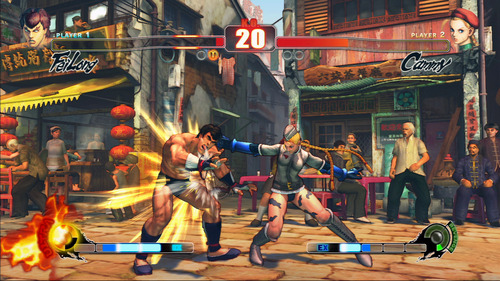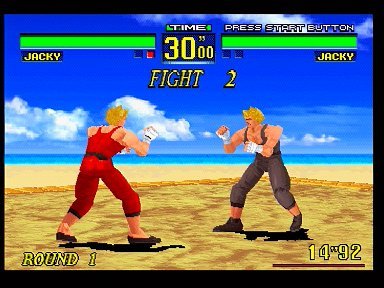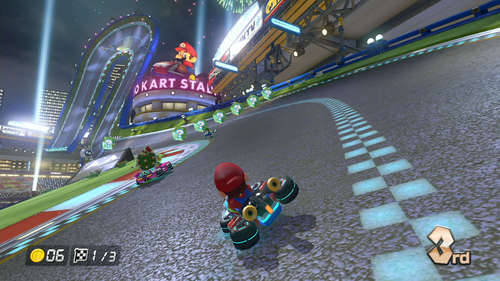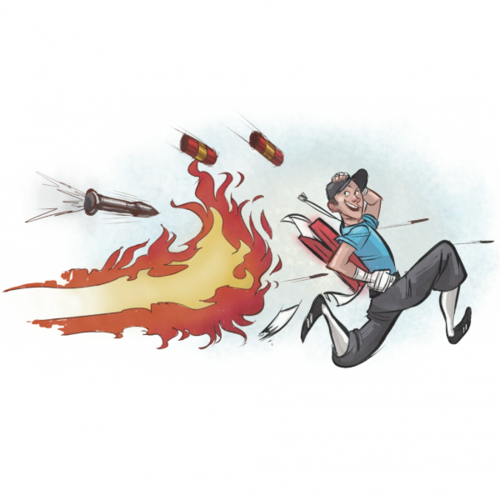Trending
Opinion: How will Project 2025 impact game developers?
The Heritage Foundation's manifesto for the possible next administration could do great harm to many, including large portions of the game development community.

Featured Blog | This community-written post highlights the best of what the game industry has to offer. Read more like it on the Game Developer Blogs or learn how to Submit Your Own Blog Post
Who has to make the plays in a game, the one in the lead or the person who is behind? Why?

Imagine you are playing a fighting game and you have a whole lot of health and your enemy has a sliver of health left, basically imagine that you are winning. In this scenario you feel not just confident but safe because even if you aren't able to kill them in the 20 seconds left you will still win when times runs out so long as you still have more health the healthier player automatically wins at that point. In this situation you, with your more health, are favored by the status quo. Should nothing drastically change, should trades be relatively equal and time keep ticking on down, you will win.

Once you are in this position you have many options for how you want to fight. Even trades will win you the game, bad trades will still win you the game, any trades at all will win you the game, or you can just sit and let them try to kill you and wait for a mistake. If one never comes, you will still win.
What if we changed the rules of this game though? What if we made it so that when time runs out, should both players still be alive, that the player with less health wins the fight? With that change in place, try to imagine how that would warp the way you play the game in the same scenario. Also, imagine how it would change how you would play if you were losing.
You still have a huge advantage on your opponent, it is still far easier for you to kill them then it is for them to kill you. It is just that now the clock isn't in your favor. Now you don't just have the option of killing them in the next 20 seconds rather you have to. Instead of you having the luxury of playing safe and taking only trades you want you have to play aggressive and try to make things happen. You have the heath advantage but now you have to press that advantage and can't just sit back and collect your victory. You have to try and force the match to a conclusion before the time limit runs out because a KO victory is the win condition that currently favors you.
Your enemy on the other hand goes from having to play aggressive and risky in order to try and take the lead to being able to just playing passivity and simply waiting for their chance if it comes. They can do this because if a good opportunity, or even a good enough one doesn't come along then they can always wait out the clock and take the walk off victory.
All of a sudden all the pressure to make things happen in the match shifts from the player currently losing to the one currently winning. This is a shift in what I like to call the 'Onus of Playmaking". The Onus of Playmaking is on whomever has to make something happen in order to win. Who has to make the plays in order to either seal their victory, or who has to make the plays in order to take victory out of the jaws of defeat?

I'm using the term "status quo" here to basically mean both sides playing equally well and perhaps slightly passively with nothing huge or drastic happening. In a fighting game it is when the two fighters trade damage equally, in a racing game it is when everyone takes the same route and perform the turns roughly equally, and so on.
Playmaking can generally be described as disrupting the status quo of the game, making huge or drastic things happen (hopefully in your favor). And it is important to remember that in a game both sides don't have equal need to force things to happen as the status quo will almost always favor one side. Typically the side that is winning is invested in protecting the status quo, as protecting the status quo is equivalent to preserving their victory, and the side that is losing is invested in disrupting the status quo for the exact same reason. This is not always the case though.
In most racing games though the Onus of Playmaking is definitely on the losing player. If two people race in the exact same way, take turns the same and so on, but one has even a 1 second lead then the person who started with that 1 second lead start will win 100% of the time. You will lose if you are behind and you need to do something, likely something risky, in order to get an advantage.

In Mario Kart if you are losing then you both get a slight speed boost and have access to stronger items with which to make plays. The slight speed boost to the loser means any lead a player might have will naturally diminish (though never go away completely) and so there is pressure on the leader to get things done (such as collecting coins or laying traps).
Also, if you are currently losing the game gives you access to items that easily make things happen and force that change you need to get ahead. The leader on the other hand tends to get items that are defensive in nature, they can use bananas to block red shells or use the horn to block the dreaded blue shell. The leader's interest is in stopping plays from happening while the loser interest is in making plays happen and the game helps facilitate both sides (though it doesn't do so equally).
In Football/Soccer/The one where you kick the spherical ball around when you are in the lead you tend to want to kill time and run out the clock. If you can get another goal then great, but it is much safer and easier to just keep clearing the ball and slowing the pace of the game down so that the other team doesn't get a point and tie up the game. When one team has the lead the win states for both teams going forward change, the team in the lead can win by either getting more goals or by just preventing the other team from getting goals. The losing side has fewer win conditions, they must get goals and the singularity of their win condition makes it easier for the opposing team to deny them this. In soccer advantage isn't expressed via all the players on one side getting a stat boost, rather the advantage is expressed via the fact that now the status quo is on their side.
The status quo doesn't always favor the side currently in the lead though, it can sometimes favor the team that is behind. There is of course my imaginary fighting game where the player with less health wins when the clock runs out, but there are also less imaginary games that have this trait. For example FPS games where the player's health quickly regenerates, either due to a recharging shield or perhaps because everyone on the battlefield is Wolverine. Imagine you just shot someone in Call of Duty, they now have less health than you but you know that if you wait 5 seconds they will get all their health back and then your advantage is gone. When you have an advantage in health you can't just sit on that advantage as if you do it will disappear shortly, you have to press that advantage home in order to get the kill.
Similarly if you are in Team Fortress 2 playing Capture the Flag then getting a kill on an enemy player can be a huge advantage for your team, you are now a player up (assuming you have an equal number of players). But that dead enemy player is going to respawn soon and just getting kills doesn't matter as you can never win the game by just getting kills, at some point you actually have to grab the enemy flag. In that case the Onus of Playmaking is on the team with the advantage. They have a player advantage but that advantage is just an opening, a window, if not pressed then the game will undo that advantage and reset the game back to even. You don't just get to have an advantage and sit on it, you must press that advantage if you are to win.

If you do succeed though and do actually capture the intelligence then your team is in the lead. If there is a time limit on the match then your team has the same advantage those soccer players have as they can either get more points or simply deny the enemy point in order to win. In that larger context then you lose the Onus of Playmaking, even if you get further opportunities by picking off enemy players. All of a sudden your team becomes fine with nothing happening as nothing happening results in your team's victory.
In MOBA games, like DOTA or LOL, if you kill the enemy team or push down their towers then you get a gold advantage. You get more gold which means you get more items which means you have more stats and activatables with which to get more kills and thus more advantages. This is very snowbally, but it must be snowbally to a certain extent because when you have an advantage you can never just sit on it, that gold advantage must be pressed into a larger one as the game goes on if you want to win. If you get an early lead and then do nothing with that lead, things like destroying towers, killing enemy players, or denying them farm, then that advantage slowly drains away.
Having 400 gold lead on your enemy is a big deal when the enemy only has 800 gold but when you both have 10,000 gold that 400 gold advantage doesn't seem to matter as much. Having more gold doesn't win you the game, it simply makes winning easier. You can't just sit back and wait for a victory regardless of how far ahead you are, the team in the lead always has to do something to claim their victory. In this way the Onus of Playmaking is on the winning team and the goal of the losing team is to play the waiting game and hope they can endure the enemy's advantage until either it diminishes enough to put them both on roughly even footing again or until the enemy team makes a bad play that can be taken advantage of.
Who has to make the plays, who has to disrupt the status quo? The answer to these questions vary from game to game and are a result of how a game expresses an advantage. Is the advantage a temporary window that must be pressed in order to win then the game? Or is it perhaps a permanent one that must be overcome by the losing side in order to win the game? Which side do you want to force playmaking upon? Who do you want to have to overcome the status quo in order to win?
Does that all make sense?
Read more about:
Featured BlogsYou May Also Like